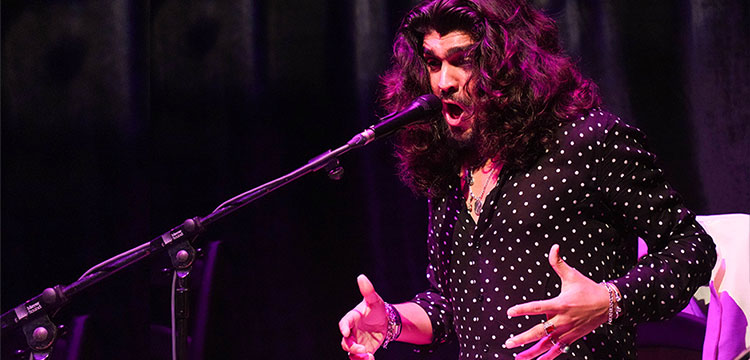Marisabel Lucas
Israel Fernández (Toledo, 1992) hugs Diego del Morao. Minutes earlier they showed the audience that few combinations of guitar and voice sound the same when they join forces. A white suit over a black shirt with white polkadots completes the image: “This morning I put on a Cuban shirt that was probably 20 years old”. Last year he published his third recording, “Universo Pastora”, a work in which the singer pays tribute to Pastora Pavón “Niña de los Peines”, bringing back some of her work and bringing it to his own turf. Following this pattern, he’s preparing his next record with Diego del Morao, while at the same time producing the recording of maestro Antonio el Rubio who, at the age of 91, only has a few LPs of fandangos from the nineteen-seventies: “I’m very pleased because it’s a new experience since it’s the first time in my life that I’ve produced a record. And furthermore, it’s very important for me, he’s a maestro and a creator”.
Israel Fernández is the name that comes up in current flamenco conversations which means things aren’t going that badly for him. When he joins in the conversation, he puts flamenco before everything else: “Flamenco has a life all its own and doesn’t need anyone. We’re the ones who need flamenco”. In relation to recent declarations about his friend and guitarist Carlos de Jacoba, who has declared that flamenco artists need to update the singing, he says he agrees: “I update the verses, I recreate them because I believe the most beautiful thing is to talk about your own true life experiences, and what better way than through singing. It’s my belief that nothing is old-fashioned or modern. For example a kiss…it’s never old-fashioned, know what I mean?” So he thinks nothing is old or new, he believes music has nothing to do with race, thus rejecting the accusation of cultural appropriation: “I don’t get that. Music has nothing to do with race or anything, it only has to do with the heart, with truth, sensitivity and the dynamic that people who make these accusations don’t have. If they had all that, they wouldn’t say the things they say. Wherever there’s affection, sensitivity and respect, there are no races. The ugliest thing a person can do is extinguish someone else”.
During the encounter, the man from La Mancha constantly repeats the word “love”. He says he does so because he believes love conquers everything and survives everything. In his way of thinking, any attempt to understand it turns into a cliché. It appears to be inborn: “When I sing, all I’m doing is adding love. That’s why I’m inspired by the people I love, my family, my friends, and also my pain and my joy. And it’s important to give affection to the audience that comes to see you, because there’s nothing more beautiful than that. It’s like when someone knocks on your door without knowing who you are, and they give you their affection: the least you can do is reciprocate”. If you ask him whether he’s aware of when things are going well on stage, he says yes, but he never forgets Camarón’s words: “It seems like you can always do it better”.
Photos: Jesús Domínguez en Flamenco Eñe Málaga
